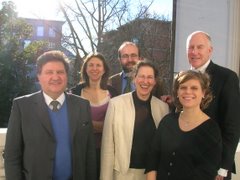The State visit of the Pope to England has been the subject of a vivid debate on the media recently. Yet this is not the only reason why it is relevant from the argumentative point of view. On Sunday, the
beatification of cardinal John Henry Newman was celebrated. For me, this was the occasion to have a look to some of the writings of this man and cardinal, in particular to "An Essay in aid of a Grammar of Assent", which, in many respects, is relevant to argumentative studies.
I will just quote a passage here:
There is another reason for attempting to discover an instrument of reasoning (that is, of gaining new truths by means of old), which may be less vague and arbitrary than the talent and experience of the few or the common-sense of the many. As memory is not always accurate, and has on that account led to the adoption of writing, as being a memoria technica, unaffected by the failure of mental impressions,—as our senses at times deceive us, and have to be corrected by each other; so is it also with our reasoning faculty. The conclusions of one man are not the conclusions of another; those of the same man do not always agree together; those of ever so many who agree together may differ from the facts themselves, which those conclusions are intended to ascertain. In consequence it becomes a necessity, if it be possible, to analyze the process of reasoning, and to invent a method which may act as a common measure between mind and mind, as a means of joint investigation, and as a recognized intellectual standard,—a standard such as to secure us against hopeless mistakes, and to emancipate us from the capricious ipse dixit of authority.
From:
An Essay in aid of a Grammar of Assent, Chapter 8 section 1 (See the full text)
Monday, 20 September 2010
Sunday, 12 September 2010
The role of argumentation in British education: an historical glimpse
Recently I was surprised by the description that Niall Ferguson makes of the (very competitive) exams that were proposed to candidates for the Indian Civil Service (the administration of the British colonies). I do not have the intention to discuss imperialism here. Ferguson wrote a brilliant essay about the British empire (Empire: How Britain made the modern world, Penguin, 2003),which I am going to cite (pp. 185-186).
I was impressed by some of the questions that candidates were asked in 1859 for their exams. The historical questions are interesting: "Enumerate the chief Colonies of England, and state how and when she acquired each of them", or "Name the successive Governors-General of British India as far as 1830, giving the dates of their Governments, and a brief summary of the main Indian transactions under each" (!). But together with these questions, the "Logic and Mental Philosophy paper" includes this one: "Classify Fallacies".
Really, I am impressed. The British administrators/governors of the colonies were asked to know some fundamentals of argumentation. I do not want to draw conclusions about British colonies, but it is an interesting clue to what the educational requirements were for a man who should work in an institutional domain.
I was impressed by some of the questions that candidates were asked in 1859 for their exams. The historical questions are interesting: "Enumerate the chief Colonies of England, and state how and when she acquired each of them", or "Name the successive Governors-General of British India as far as 1830, giving the dates of their Governments, and a brief summary of the main Indian transactions under each" (!). But together with these questions, the "Logic and Mental Philosophy paper" includes this one: "Classify Fallacies".
Really, I am impressed. The British administrators/governors of the colonies were asked to know some fundamentals of argumentation. I do not want to draw conclusions about British colonies, but it is an interesting clue to what the educational requirements were for a man who should work in an institutional domain.
Wednesday, 8 September 2010
New (personal) website
On September 1, I started my stay as a visiting lecturer at University College London. On this occasion, I opened a new personal website, on which you can read all my present research interests and download some pre-prints of my publications: Sara Greco Morasso's webpage
I also have a homepage on Academia.edu: http://ucl.academia.edu/SaraGrecoMorasso, which I am trying to keep up-to-date. I believe this is a network that will certainly grow bigger, because you can 'meet' international colleagues in your research area, see their publications and informally follow their work.
I also have a homepage on Academia.edu: http://ucl.academia.edu/SaraGrecoMorasso, which I am trying to keep up-to-date. I believe this is a network that will certainly grow bigger, because you can 'meet' international colleagues in your research area, see their publications and informally follow their work.
Communication and Cognition 2011: submit your abstract by September 12
Reminder: the deadline for the submission of abstract for Communication and Cognition 2011 is September 12. Have a look to the website! See you in Neuchâtel!
http://www2.unine.ch/comcog2011
http://www2.unine.ch/comcog2011
Subscribe to:
Comments (Atom)


